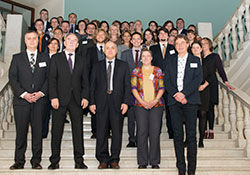Autumn School helps Member States make Health 2020 reality

WHO
Some 30 participants gathered in Moscow, Russian Federation, for the third annual Autumn School on health information and evidence for policy making. The Autumn School, the flagship training course of the WHO Regional Office for Europe on health information and part of the WHO European Health Information Initiative, helps countries to focus on health information as part of the implementation of Health 2020. The topics for the course were carefully chosen in order to reflect health 2020 priorities.
During the one week course, participants learned about:
- public health indicators in general;
- Health 2020 targets and indicators and monitoring framework;
- data needs and methods for monitoring health inequalities;
- data sources for Health 2020 indicators and how to assess the quality of the data coming from these sources;
- quality criteria for health reporting and making policy recommendations based on Health 2020 priorities;
- tools and good practices for narrowing the gap between research and policymaking and focusing on the translation of evidence into policy.
The course brought together public health experts from a wide variety of backgrounds – academic, ministerial and institutional – using real scenarios and data as a basis for discussion as much as possible.
Throughout the course, participants were encouraged to link what they learned to their national health information systems. This ensured that participants took home insights and solutions that were directly applicable to their national situations.
Presenters from the universities of Durham and Manchester (United Kingdom), National Institute for Public Health and the Environment, RIVM (Netherlands), WHO Collaborating Centre for Health Statistics and Analysis, (Russian Federation) and the Ministry of Health of the Republic of Moldova were joined by WHO staff.
Professor Paulo Jorge da Silva Nogueira from Directorate-General of Health of Portugal said: "The course was excellent. I appreciated the possibility to learn new practical tools and techniques that I can start using immediately in my daily practice. I especially enjoyed learning from the other participants and the discussions were fascinating."
Dr Claudia Stein, Director of the Division of Information, Evidence, Research and Inovation at the WHO Regional Office for Europe which organized the School, said: "Three things make the Autumn School so successful. Firstly the extremely high standard of the presenters, secondly the subject matter being rooted in the day-to-day work of the participants and what is useful and lastly the participants, who throw themselves so wholeheartedly into each activity. The Autumn School is going to go from strength to strength every year."



